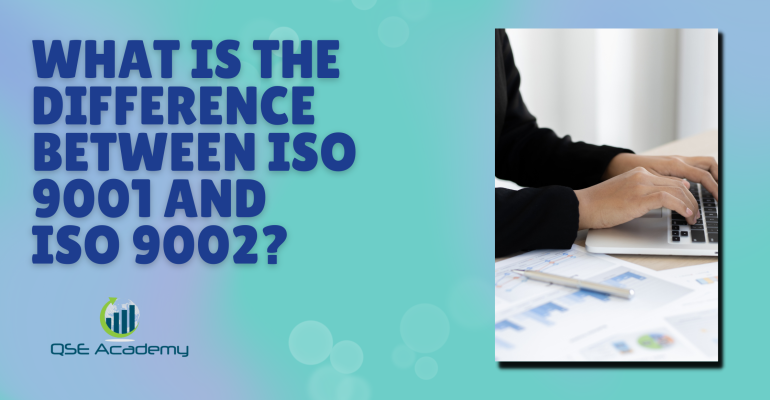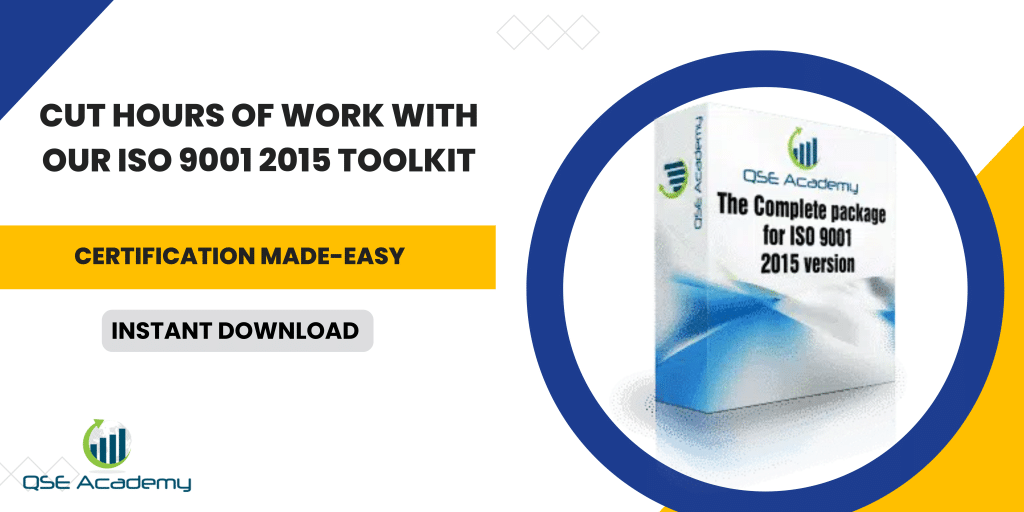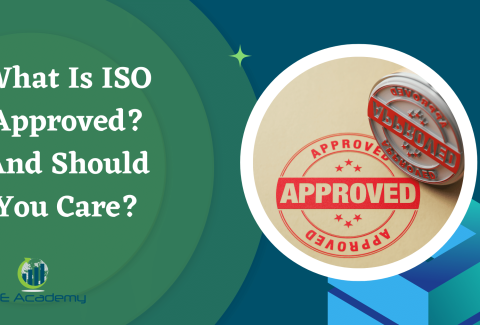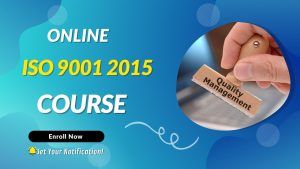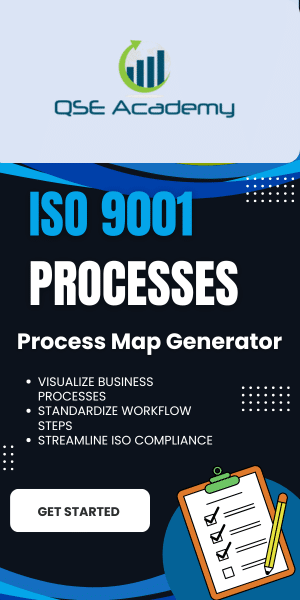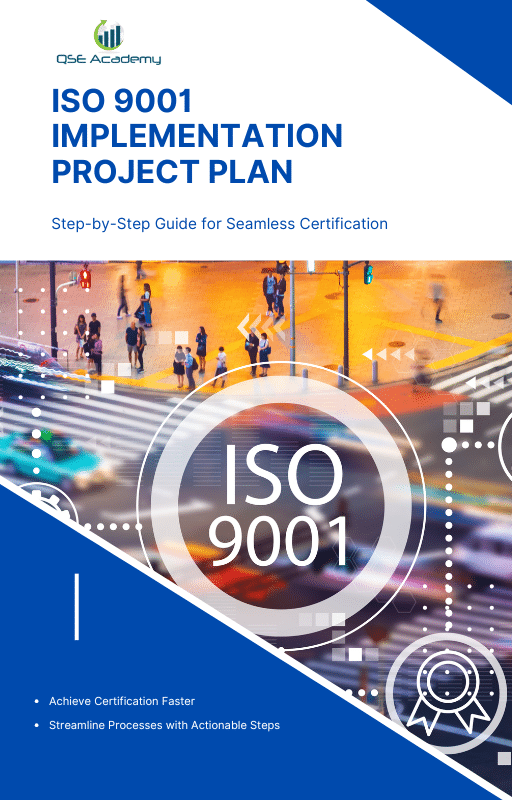What is the difference between ISO 9001 and ISO 9002?
Last Updated on October 13, 2025 by Hafsa J.
What is the Difference Between ISO 9001 and ISO 9002?
ISO 9002 was a quality management standard focused specifically on production and installation processes, excluding design and development. It was part of the original ISO 9000 series, used by companies that did not engage in product design but needed to ensure consistent quality in manufacturing and implementation. However, ISO 9002 was officially withdrawn in 2000, and its essential principles were integrated into ISO 9001.
ISO 9001, by contrast, is the active and current international standard for quality management systems (QMS). It covers design, development, production, and delivery, and remains the gold standard for organizations committed to quality, efficiency, and customer satisfaction across all industries.
While ISO 9002 was discontinued in 2000, its principles were merged into ISO 9001, making ISO 9001 the gold standard for businesses today. This article will dive into these differences and explain why ISO 9001 remains relevant while ISO 9002 has been retired. Let’s get started!
If you’re researching the difference between ISO 9001 and ISO 9002, or wondering whether ISO 9002 certification still holds value today, this article provides a clear, no-nonsense breakdown to help you move forward with confidence.
[wpcode id=”47946″]
Understanding ISO Standards
Before we jump into the difference between ISO 9001 and ISO 9002, let’s take a step back and understand what ISO standards are all about. Don’t worry—it’s not as complicated as it sounds!
What Are ISO Standards?
Imagine if every business in the world followed its own random set of rules. Things would get messy fast, right? That’s where ISO (International Organization for Standardization) comes in. ISO creates standards that help businesses operate in a structured and consistent way. These standards ensure products and services meet certain quality, safety, and efficiency requirements. Think of them as guidelines to help companies work smarter and keep customers happy.
Now, when it comes to quality management, there’s a whole family of standards called the ISO 9000 series. This is where ISO 9001 and ISO 9002 come into play. These standards were designed to help businesses improve their processes and deliver consistent quality.
The ISO 9000 Family
The ISO 9000 series is like a toolbox for quality management. It includes different standards, each focusing on specific aspects of quality. While ISO 9001 is the most well-known and widely used, ISO 9002 was once an important part of the family too. Understanding the difference between ISO 9001 and ISO 9002 starts with knowing their place in this series.
Here’s a quick breakdown:
- ISO 9001: Focuses on the overall quality management system and can be applied to any organization, in any industry.
- ISO 9002: Was specifically designed for production and installation processes but has since been phased out.
Think of it this way: ISO 9001 is like a universal manual for quality management, while ISO 9002 was more specialized. Over time, the principles of ISO 9002 were merged into ISO 9001, making the latter the go-to standard for businesses worldwide.
Why ISO Standards Matter
Whether you’re running a small business or managing a large company, following an ISO standard shows that you care about delivering quality. It builds trust with customers and helps your business run more efficiently. That’s why so many companies today rely on ISO 9001.
But what about ISO 9002? Why isn’t it used anymore? And what makes ISO 9001 the preferred choice? Don’t worry—we’ll dig deeper into the difference between ISO 9001 and ISO 9002 in the next sections. You’ll see exactly how these two standards compare and why one is still the gold standard for quality management today.
The Basics of ISO 9002
ISO 9002 was part of the original ISO 9000 family, which focused on quality management systems (QMS). While ISO 9001 is widely recognized today, ISO 9002 once had a specific role to play. To understand the difference between ISO 9001 and ISO 9002, let’s break things down clearly.
What Was ISO 9002?
This meant ISO 9002 was perfect for businesses that didn’t handle product creation but needed to ensure quality in manufacturing and installation processes. For example, a company assembling components based on someone else’s design might have opted for ISO 9002.
Why Was ISO 9002 Retired?
In 2000, ISO updated the entire 9000 family of standards. During this revision, ISO 9002 was officially phased out, and its principles were integrated into ISO 9001. The consolidation created a single, comprehensive standard—ISO 9001:2000—that could apply to all types of businesses, including those previously certified under ISO 9002.
The goal of this change was to simplify the ISO certification process and eliminate confusion between the standards. By merging the best features of ISO 9002 into ISO 9001, the ISO organization made it easier for companies to adopt a unified approach to quality management.
What About ISO/TS 9002:2016?
You might have heard of ISO/TS 9002:2016, which is still in use today. While it shares the “9002” designation, it’s not the same as the retired ISO 9002 standard. Instead, ISO/TS 9002:2016 is a technical specification that provides guidelines for applying ISO 9001:2015. It acts as a companion document to help businesses interpret and implement ISO 9001’s requirements more effectively.
Key Takeaways on ISO 9002
The difference between ISO 9001 and ISO 9002 is clear:
- ISO 9001: A comprehensive standard that applies to all aspects of quality management, including design, production, and delivery. It’s still the global benchmark for QMS.
- ISO 9002: A retired standard that focused on production and installation but excluded design and development. Its principles are now part of ISO 9001.
- ISO/TS 9002:2016: A guidance document for applying ISO 9001:2015, not a standalone standard.
If you’re pursuing ISO certification today, ISO 9001 is the standard to focus on, while ISO/TS 9002:2016 can serve as a helpful resource to guide your implementation journey.
Why ISO 9001 is the Gold Standard Today
When we talk about the difference between ISO 9001 and ISO 9002, one thing becomes very clear: ISO 9001 has stood the test of time. It’s not just a standard—it’s the global benchmark for quality management systems (QMS). So, what makes ISO 9001 so special, and why is it still the go-to choice for businesses worldwide? Let’s break it down.
ISO 9001: A Standard That Grows With You
One of the key reasons ISO 9001 remains so popular is its flexibility. Unlike ISO 9002, which had a more limited scope, ISO 9001 is designed to work for any business, no matter the size or industry. Whether you’re a small local bakery or a multinational corporation, ISO 9001 can be tailored to fit your needs.
This flexibility is a huge difference between ISO 9001 and ISO 9002. While ISO 9002 was great for specific processes like manufacturing and installation, it didn’t cover areas like design and development. ISO 9001, on the other hand, includes it all—making it a one-stop solution for quality management.
Updated for Modern Business Needs
Another reason ISO 9001 is the gold standard is that it evolves with time. The latest version, ISO 9001:2015, introduced new concepts like risk-based thinking, a stronger focus on leadership, and enhanced customer satisfaction. These updates make it relevant to today’s fast-paced and competitive business environment.
This evolution also explains why ISO 9002 became unnecessary. Its best features were absorbed into ISO 9001, creating a single, powerful standard that addresses every aspect of quality management.
Universal Recognition and Trust
Let’s face it: certifications can be confusing, and customers may not always know what they mean. But ISO 9001 is an exception. It’s recognized worldwide as a symbol of quality and trust. When businesses display the ISO 9001 certification, it signals to their customers, partners, and stakeholders that they take quality seriously.
This universal recognition is another key difference between ISO 9001 and ISO 9002. ISO 9001 became the leader because it’s comprehensive and applicable to everyone, while ISO 9002 was more specialized and eventually faded out of use.
What This Means for Your Business
If you’re considering implementing a quality management system, ISO 9001 is the standard you need. It’s more than a set of rules—it’s a framework that helps your business run more efficiently, improve customer satisfaction, and stay competitive in any market.
While ISO 9002 played a valuable role in the past, its principles now live on in ISO 9001. By focusing on ISO 9001, you’re not just adopting a standard—you’re investing in the long-term success of your business.
The difference between ISO 9001 and ISO 9002 boils down to relevance and adaptability. ISO 9001 continues to evolve, making it the gold standard for quality management, while ISO 9002 has become part of history. For businesses today, the choice is clear: ISO 9001 is the way forward.
FAQ: Common Questions About the Difference Between ISO 9001 and ISO 9002
[sp_easyaccordion id=”46720″]
My Take as a Consultant on ISO 9001 vs ISO 9002
While I wasn’t active back when ISO 9002 was still certifiable, I’ve worked with many companies that inherited legacy systems based on it. What I’ve seen consistently is this: the shift to ISO 9001 isn’t just a technical upgrade—it’s a mindset shift. ISO 9001 pushes businesses to think more holistically, to embed quality into leadership, customer relationships, and continuous improvement. That’s the real difference. ISO 9002 was process-focused; ISO 9001 is system-driven. And in today’s market, only the latter makes sense.
Whether I’m advising startups or mature industrial operations, I’ve found ISO 9001 to be one of the most powerful frameworks for building trust, aligning teams, and scaling without losing control over quality. It’s not about ticking boxes—it’s about running a smarter, more resilient business.
If you’re considering implementing a quality management system, ISO 9001 is the standard to aim for. Its proven track record and universal recognition make it the gold standard for businesses that want to stay competitive in today’s fast-changing world. And if you ever need guidance, don’t forget that resources like ISO/TS 9002:2016 are there to help you every step of the way.
The difference between ISO 9001 and ISO 9002 might seem technical at first, but understanding it shows just how far quality management standards have come. Ready to start your ISO journey? Dive into ISO 9001 and see the difference it can make for your business!
Ready to move from ISO 9001 theory to implementation?
Get the exact tools you need to write your documentation, train your team, map your processes, and pass your audit—without wasted time or guesswork.

make ISO standards less intimidating and more approachable for everyone.
Whether it’s ISO 9001, ISO 22000, or the cosmetics-focused ISO 22716, I’ve spent my career
turning complex jargon into clear, actionable steps that businesses can actually use.
I’m not here to call myself an expert—I prefer “enthusiast” because I truly love what I do.
There’s something incredibly rewarding about helping people navigate food safety and quality management systems
in a way that feels simple, practical, and even enjoyable.
When I’m not writing about standards, you’ll probably find me playing Piano 🎹, connecting with people, or diving into my next big project💫.
I’m an engineer specialized in the food and agricultural industry
I have a Master’s in QHSE management and over 12 years of experience as a Quality Manager
I’ve helped more than 15 companies implement ISO 9001, ISO 22000, ISO 22716, GMP, and other standards
My clients include food producers, cosmetics manufacturers, laboratories, and service companies
I believe quality systems should be simple, useful, and efficient.

